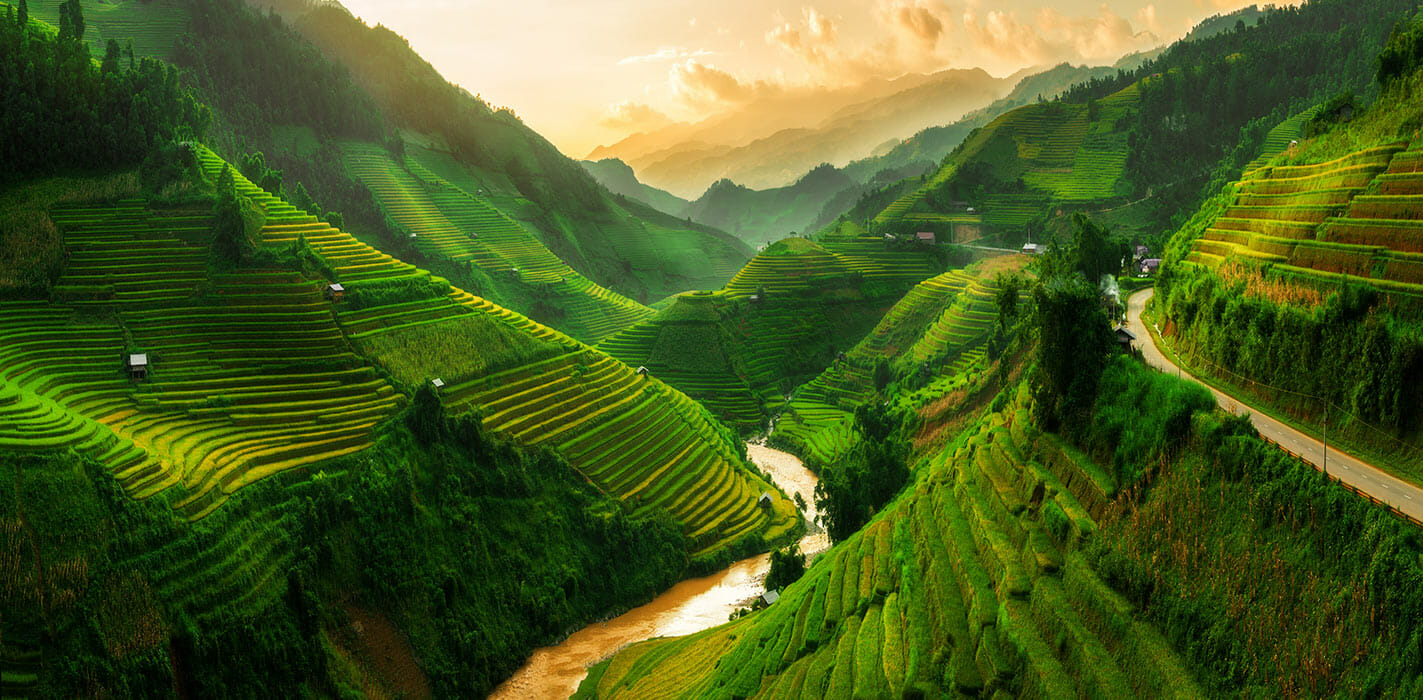Sapa Travel Guide
Sa Pa Vietnam
Sa Pa Town is located in Lao Cai Province, north-west Vietnam, and 350 km north-west of Hanoi, close to the border with China. Sapa is famous both for its fine, rugged scenery and for its rich cultural diversity. In the history, French used to consider Sapa as Summer Capital of Northern Vietnam in the early decades of the 20th century. Its naturally gifted beauty keeps attracting more and more people to spend their vacation there since then. Particularly, the place is the foremost choice for honeymoon couples!
Geographically: Sapa is exactly a mountainous area of Northwest Vietnam. The whole Sapa District is dominated by the Hoang Lien Son mountain range which is at the Eastern extremity of the Himalayas, being famous with the Vietnam’s highest mountain of Fa si pan at a height of 3,142 m above sea level. The town of Sa Pa lies at an altitude of about 1,600 m, bringing in a cool and foggy site of Sa Pa.
Sapa Weather & Climate: Taking a night train from Hanoi to Lao Cai, and then 45 minutes more from Lao Cai City by bus, Sapa appears in fanciful fog. Thanks to the height of 1,600 m above the sea level, the average temperature of the area is always 15-18°C, cool in summer, but a bit cold in winter. Sapa takes its pride in its unique climate in Vietnam. It is highly seasonal, with a subtropical climate in the summer and a temperate climate during the winter. Mean annual temperature for Sa Pa town is 15.4°C, with a maximum of 29.4°C and a minimum of 1°C. The warmest months are July and August, and the coldest months are December and January. Snow falls in some years on the highest peaks. In the morning and afternoon, it is as cool as in spring and autumn. Yet, at noon, it is as sunny and cloudless as in summer.
In the evening, it drastically changes into coldness just as in winter. This is actually a unique advantage, making Sapa different from anywhere else in the nation. However, travelers should be noticed that there might be sudden thunderstorm and heavy rains at noon in summer. Yet, subsequently, a rainbow appears turning Sapa into a beautifully magic land with seven colors! So, remember to bring your best camera so as not to miss this magnificent view! April and May are the best time for tourists to watch the most scenic beauties of Sapa, or else it might be cold and foggy before that and rainy after that. During these two peak months, the town is blossoming with pink and white flowers, and green pastures in valleys. The clouds that settle in the valley in early morning would quickly disappear.
The scenery of the Sapa region in large part reflects the relationship between the ethnic minority people and nature. This is seen especially in the paddy fields carpeting the rolling lower slopes of the Hoang Lien Mountains. The impressive physical landscape, which underlies this, has resulted from the work of the elements over thousands of years, wearing away the underlying rock.
Historical Monthly Average Temperature and Rain Falls for Sapa.
| Months | High / Low (°C) | Rain Falls |
| January | 19.9° / 9.8° | 6.6 days |
| February | 23.3° / 10.9° | 3.2 days |
| March | 27.1° / 14.3° | 6.4 days |
| April | 29.2° / 16.7° | 13.0 days |
| May | 29.8° / 18.7° | 19.3 days |
| June | 28.7° / 19.7° | 25.9 days |
| July | 28.0° / 19.1° | 28.0 days |
| August | 28.3° / 18.7° | 27.2 days |
| September | 27.5° / 17.6° | 22.0 days |
| October | 25.3° / 15.0° | 11.7 days |
| November | 23.7° / 13.0° | 5.3 days |
| December | 20.4° / 9.8° | 3.5 days |
Most tourists agree that it would be regretful if the leisure and relaxation time in cool and fresh weather is not accompanied by visiting trips to Sapa’s prideful natural beauty spots, such as Ham Rong Mountain, Silver Waterfall, Rattan Bridge, Bamboo Forest and Ta Phin Cave. The town is also the starting point for many mountain climbers and scientists who would like to discover the Fansipan Mount, the highest mountain in Vietnam with 3,143 m height. Can you imagine that Hoang Lien Mountain Range is called “the Alps of the North Sea area” since Fansipan Mount also marks its greatest height among others in the Indochina Peninsula as well. The pyramid-shaped mountain is covered with clouds all the year round. On top of the mountain is filled with frequent below zero temperature, especially at high altitudes.
On approaching the town, the very first thing tourists may find is the detached wooden mansions and villas perched on top or side of the hills, behind thick pine forests, hided by fog in the morning. Old and new villas with red roofs now appear and then disappear in the green rows of pomu trees, bringing in the beauty of European towns.
Food Specialties: Foreign tourists are actually fond of scarce and precious specialties of Sapa, such as forest’s product, handicrafts, delicacies (smoked meat, “thang co”, “cai meo”, san lung wine, corn wine, etc.), typical of ethnic minority people. Most travellers do like to bring some of the local fresh vegetables back home for presents. Thanks to the fresh and cool air, Sapa is the ideal land for fresh temperate vegetables such as cabbage, chayote, precious medical herbs, fruit trees (plum, pear), and so on.
Cultural diversity: Sapa is famous for its special cultural diversity in a combination of ethnic minority groups’ culture. Visitors to Sapa will have opportunities to discover the unique customs of the local residents. Local markets are the town’s typically cultural element, which are always crowded and joyful, attracting hundreds of visitors. This is the common place for minority groups to gather and exchange goods. Market sessions are also a chance for local people to promenade. No foreign visitor could help joining such a market session, a typical cultural element of Sapa.
What is more, tourists coming to Sapa at weekends have the great chance to learn about local ethnic people's courtship and martial life, through the Sapa love market and wife kidnapping ceremony of the H’Mong group. The ceremony will begin on April 29th. This is part of a five-day festival, titled Festival on the Cloud, to mark the beginning of the Sapa 2006 tourism year, in the northern mountain township of Sapa, in Lao Cai Province. If ever asked to drop a quick comment, even the toughest person must admit the romance and peace of a magnificently cool and beautiful Sapa! I hope you should spend a short summer here, and you will soon share the idea.
Best Time to visit Sapa: Best time of year to travel to Sapa is from March to May and from September to November. At these times, the weather is relatively stable with sunny days and cool nights. The first period is the fall time. At this time of the year, the weather is very comfortable for tourism. It is dry, clear with much sunshine. The view of Sapa’s terraces is at its best between September and October. The cool and dry weather with the stable temperature makes it the perfect time for trekking and photos. You can get to Sapa from Hanoi by Bus or Train.
Best of Vietnam
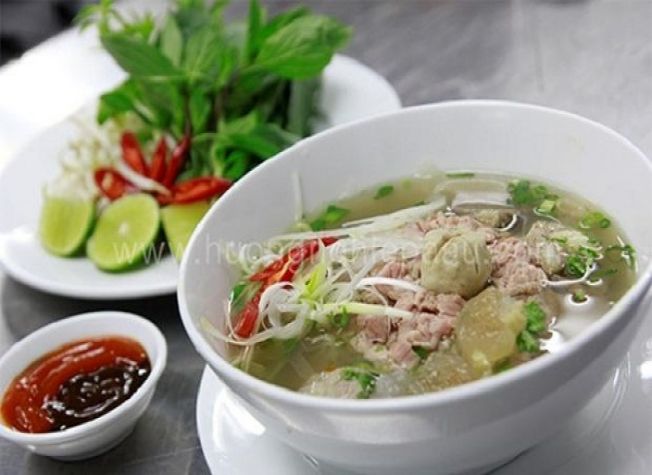
Best Vietnamese Food You Have to Try in Vietnam
Best Food in Vietnam: Vietnamese Traditional Food is top World well known to be both healthy and...
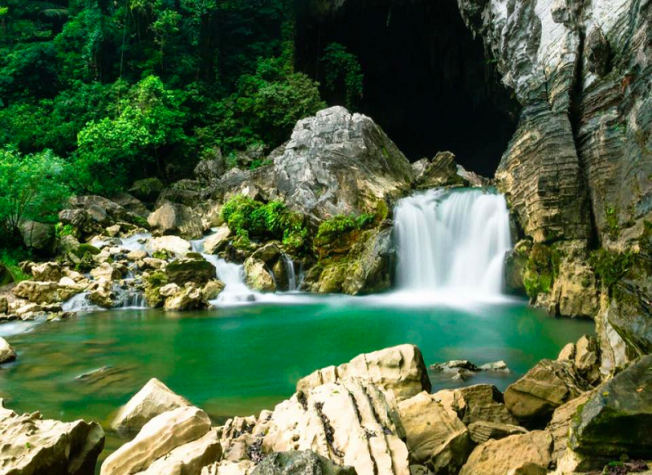
10 Best National Parks in Vietnam
Vietnam Travel Guide: If you look for the Best Wildlife Discovery Experience in Vietnam, here are...
Read More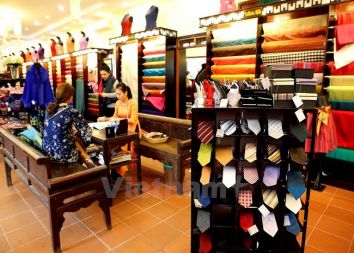
Best Souvenir to Buy in Vietnam
If you look for Best Things to Buy when traveling to Vietnam to bring home for your family & friends...
Read More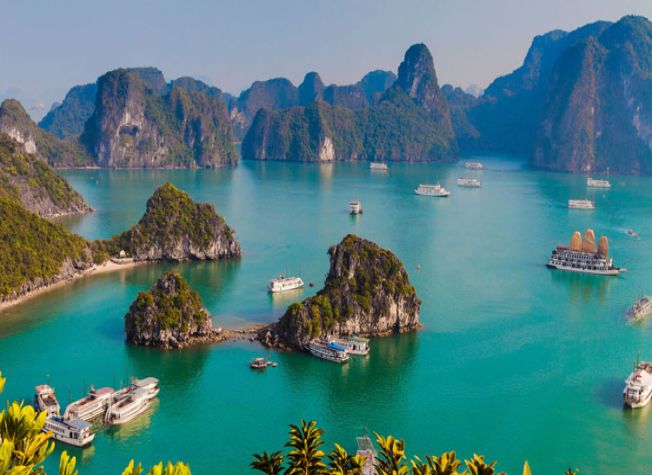
The 10 Best Places to Visit in Vietnam
Vietnam Travel Guide: Home to an extensive collection of historical and cultural attractions,...
Read More
Top 10 Museums You Should Not Miss in Vietnam
Vietnam, 4.000 years old country has a unique and lengthy history, culture with 54 ethnic groups. It...
Read MoreFind your trip
Vietnam Best Tours
Vietnam Car Rental
Vietnam Travel Blog
- Vietnamese People: Origin, History, Culture and Traditions
- Vietnam Currency: Best ATM and Places to Exchange Money
- Vietnam Map: Regions, Cities & Provinces Map of Vietnam
- What is illegal Things in Vietnam: Rules & Laws for Tourists
- Best Time to Travel to Vietnam to Avoid the Bad Weather
- Vietnam News: Population & Religions of 54 Ethnic Groups

